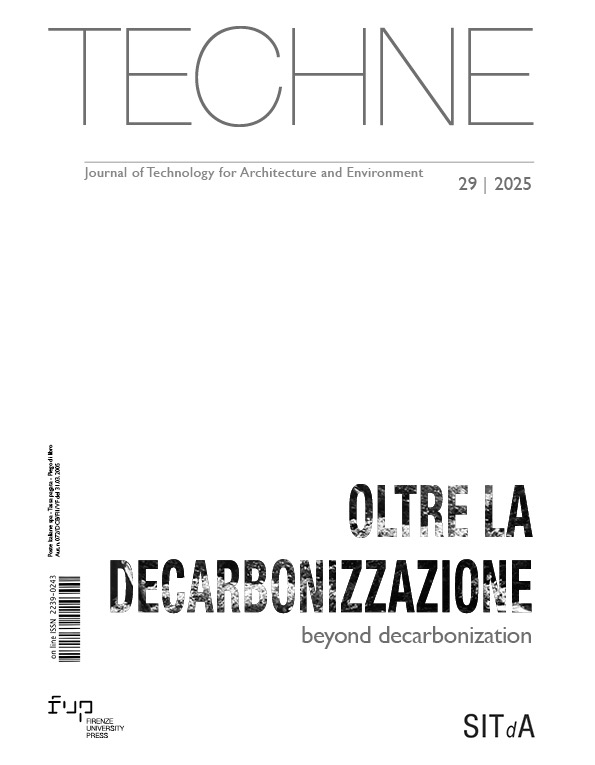Published 2025-07-31
Keywords
- environmental design,
- wastewater management,
- greening urbano,
- biophilic design,
- biotecnologie
How to Cite
Copyright (c) 2025 Attilio Nebuloni, Fiammetta Costa, Giorgio Buratti, Matteo Meraviglia, Luciana Migliore, Annamaria Alabiso, Valerio Cantelmo

This work is licensed under a Creative Commons Attribution 4.0 International License.
Abstract
Among the strategies capable of addressing the multiple challenges related to achieving the NetZero target, urban greening is not only a strategy to increase the energy efficiency of buildings but also an opportunity to design new scenarios of biophilic living, capable of re-establishing positive connections between people and nature in the built environment. In this context, an area of study of growing interest focuses on the sustainable recovery of domestic greywater for reuse in buildings for irrigation purposes. The paper outlines the results of an interdisciplinary research project, which, through bio-filtration processes, enables the recovery of wastewater from household appliances to supply green architecture solutions.
Downloads
References
- Anderson, J. et al. (2008), “Public acceptance of water reuse”, in Jimenez, B. and Asano, T. (Eds.), Water Reuse: An International Survey of current practice, issues and needs, IWA, London.
- Barbagallo, S. et al. (2003), “Wastewater reuse in Italy”, in WS&T, 43(10): 43-50. Available at: https://doi.org/10.2166/wst.2001.0576 DOI: https://doi.org/10.2166/wst.2001.0576
- Bichai, F. et al. (2018), “Addressing Barriers in the Water-Recycling Innovation System”, in Journal of Cleaner Production, 171: 97-109. Available at: https://doi.org/10.1016/j.jclepro.2016.07.062 DOI: https://doi.org/10.1016/j.jclepro.2016.07.062
- Congestri, R. et al. (2019), “The biological filter for an innovative Sustainable Product System to recycle domestic wastewater”, in European Recent Advances in the Microalgae Field, EuAlgae COST Action, Madrid.
- Costa, F. and Nebuloni, A. (2021), The Jetsons’ kitchen. A zero-mile system for wastewater recycling and cultivation, FrancoAngeli, Milano.
- Feeny, D. et al. (1990), “The Tragedy of the Commons”, in Human Ecology, 18(1): 1-19. Available at: https://doi.org/10.1007/BF00889070 DOI: https://doi.org/10.1007/BF00889070
- Gonçalves, A.L. et al. (2017), “A review on the use of microalgal consortia for wastewater treatment”, in Algal Research, 24: 403-415. Available at: https://doi.org/10.1016/j.algal.2016.11.008 DOI: https://doi.org/10.1016/j.algal.2016.11.008
- Karana, E. et al. (2020), “Living Artefacts: Conceptualizing Livingness as a Material Quality in Everyday Artefacts”, in International Journal of Design, 14: 37-53.
- Kellert, S. and Wilson, E. (1993), The Biophilia Hypothesis, Island Press, Washington.
- Kellert, S. and Calabrese, E. (2015), The Practice of Biophilic Design. Available at: http://www.biophilic-design.com
- Kunz, N.C. et al. (2016), “Drivers for and against municipal wastewater recycling: A review”, in WS&T, 73(2): 251-259. Available at: https://doi.org/10.2166/wst.2015.496 DOI: https://doi.org/10.2166/wst.2015.496
- Marres, N. (2012), Material Participation: Technology, the Environment and Everyday Publics, Palgrave Macmillan, London. DOI: https://doi.org/10.1057/9781137029669
- Nebuloni, A. et al. (2019), “Zero-kilometre plants production”, in Ambrosio, M. and Vezzoli, C. (Eds.), Designing sustainability for all, POLI.design, Milano.
- Posadas, E. et al. (2013), “Carbon and nutrient removal from centrates and domestic wastewater using algal–bacterial biofilm bioreactors”, in Bioresource Technology, 139: 50-58. Available at: https://doi.org/10.1016/j.biortech.2013.04.008 DOI: https://doi.org/10.1016/j.biortech.2013.04.008
- Posadas, E. et al. (2017), “Microalgae cultivation in wastewaters”, in Muñoz R. and González C. (Eds.), Microalgae-Based Biofuels and Bioproducts, Elsevier, 67-91. DOI: https://doi.org/10.1016/B978-0-08-101023-5.00003-0
- Prutzer et al., (2023), “Rethinking responsibility in precision agriculture innovation: lessons from an interdisciplinary research team”, in Journal of Responsible Innovation, 10(1): 13. Available at: https://doi.org/10.1080/23299460.2023.2202093 DOI: https://doi.org/10.1080/23299460.2023.2202093
- Stappers, P.J. and Giaccardi, E. (2017), “Research through Design”, in Soegaard, M. and Friis-Dam, R. (Eds.), The Encyclopedia of Human-Computer Interaction, The Interaction Design Foundation.
- Volontè, P. and Grana, M. (2021), “What people think: Attitudes towards recycling, recycling for food use, and a prototype eco-dishwasher”, in Costa F. and Nebuloni A. (Eds.), The Jetsons’ kitchen, FrancoAngeli, Milano.
- Walk, H. and Dierich, A. (2014), “Urban agriculture of the future: An overview of sustainability aspects of food production in and on buildings”, in Agriculture and Human Values, Springer Nature, (31). Available at: https://doi.org/10.1007/s10460-013-9448-4 DOI: https://doi.org/10.1007/s10460-013-9448-4
- Weisser, W.W. et al. (2023), “Creating ecologically sound buildings by integrating ecology, architecture and computational design”, in People and Nature, Wiley & Sons, 5: 4–20. Available at: https://doi.org/10.1002/pan3.10411 DOI: https://doi.org/10.1002/pan3.10411
- WWAP, United Nations World Water Assessment Programme (2017), “The United Nations World Water Development Report 2017”, in Wastewater: The Untapped Resource, Paris, UNESCO. Available at: https://doi.org/10.18356/df181e6f-en DOI: https://doi.org/10.18356/df181e6f-en






